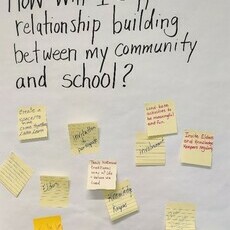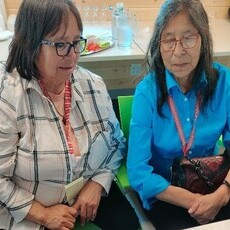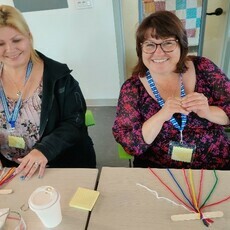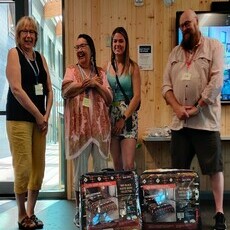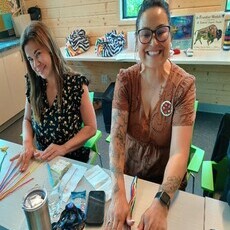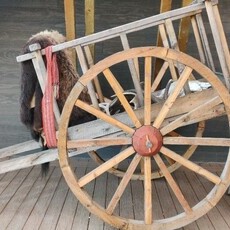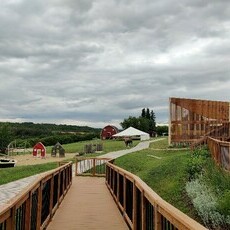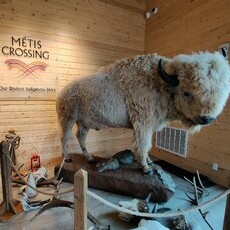NSD hosts gathering at Métis Crossing to support student learning experience
Posted on July 5
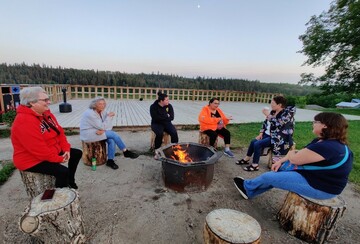
Northland School Division (NSD) hosted a gathering on June 28, 2023, at Métis Crossing. The coming together in a land-based cultural interpretive centre in Alberta was an important experience for the Métis first-year and veteran kiskinwahamâkêwak (Cree-speaking educators) and education partners. NSD recognize that each of the six Métis settlements and Métis communities—Willow Lake, Susa Creek, Wabasca-Desmarais—needed to be together to network and share how they are applying historical, social, and cultural connections in their schools and classrooms that contribute to Métis student learning, lifestyle and wellbeing.
Historically, Métis people know that land is a teacher connecting local Elders, self-esteem, pride, identity, culture, and language to place. Métis Crossing is the place that has replicated the earliest and distinct Métis culture of 1600-1800 lifestyles. It is a place that builds uniqueness, connections to the land, and heritage species i.e. white bison, wood bison, plains bison, elk, and percheron horses.
The gathering of communities brought Elders, knowledge keepers, educators, partners, staff, and families to contribute their sharing of life experiences, successes, and celebrations in education. NSD learning goals set forth were to increase, enhance and make connections to one another through stories, perspectives, and ways of knowing, being, and doing. The land connection and blending of Cree/Métis values provided that opportunity for leadership, learning, and relationships. It was amazing how one was related to others through community kinships, marriages, and friendships.
Memories formed around common ancestry and awe of nature brought them home to those happy times on the land. They felt physically grounded to ᐊᐢᑭᕀ askiy (earth), moved with creativity as ᐃᐢᑯᑌᐤ iskotew (fire) danced, drifting along with the river’s flow of churning ᓂᐯᕀ nipîy (water) and yihiwin (breathing) in the fresh air. All human selves in terms of physical, mental, emotional, spiritual, and social needs were met.
NSD is working with Emily Milne from MacEwan University to learn how families and schools can come together to help students succeed. Schools across NSD are involved in discussions to better understand how families and community members can be part of the ongoing engagement process aligning actions of 2015 Truth and Reconciliation. Using focus groups, interviews, and surveys, Emily presented and invited participants to contribute their voices to enhance literacy, numeracy, languages, and culture.
NSD understands how important Indigenous voices are for sharing local perspectives, experiences, and ideas. Through ᒥᔪ ᐃᐧᒉᐦᑐᐃᐧᐣ miyo wicehtowin, community brokers help to increase curriculum and pedagogy. This occurs when relationships between school and community value ᐊᐧᐦᑯᐦᑐᐃᐧᐣ wahkohtowin (kinship beyond the immediate family). As partners in education, Virginia Cardinal and Dallas L’Hirondelle were acknowledged and given appreciation as community brokers in their schools for increasing ways of knowing, doing, and being. As well, resource partners in education through Rupertsland Centre for Teaching and Learning (RCTL) provided guidance through a gallery walk into their website. Staff can download app-based learning activities to bring Métis Albertans and content into their classrooms.
Throughout his life, Dr. Elmer Ghostkeeper has actively promoted the rights of Métis people. He is the holder of two Anthropology degrees from the University of Alberta. In November 2022, he received an honorary Doctor of Law. His focus at the session was to share his extensive knowledge of Métis Settlement identity, language, land, and scholarly work.
As soon as he started to speak, all participants praised his work and accomplishments through values of respect and humbleness. He talked about compassion and love as a valid way of learning and relationships. He recommended always asking for guidance from parents, Elders, teachers, and Métis members of the community. Especially in search of answers to questions on what success should look like for teaching Indigenous perspectives and experiences. His philosophy for deepening an understanding of worldview is to focus on the world surrounding the student and to facilitate learning on kinship, family, law, and language.
In terms of deepening our understanding of his collaborative project with survival and worldview awareness, he recommended reading his book Spirit Gifting The Concept of Spiritual Exchange.
The takeaway from this gathering is ᒪᒪᐦᐅᐧᐦᑲᒪᑐᐃᐧᐣ mamahwohkamatowin to continue working together. Language and culture instructors are supportive of weaving knowledge into the curriculum by working closely with their Elders and Knowledge keepers to gain knowledge of the past, present, and access to land-based learning spaces in their communities. The tour guides provided visions, hopes, and dreams for every student to immerse themselves in their heritage.
The Métis speaking the language and culture instructors were inspired by their learning experiences and relationship-building at Métis Crossing. They are more committed to enhancing student learning through land-based learning and Michif heritage.
The tours gave them an optimal learning opportunity to see the beauty and land of Métis Crossing with advocacy to bring back the memories of this sacred place to all their students with the possibility to revisit the site in the fall with them.



